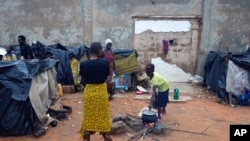The United Nation's International Organization for Migration — the IOM — said Friday that border closures and airspace restrictions caused by the July 26 coup in Niger have disrupted migration patterns in the nation, putting hundreds of thousands of migrants and displaced persons at risk.
The coup by Niger's military leaders overthrew democratically elected President Mohamed Bazoum and put him under house arrest.
At a news conference in Geneva on Friday, IOM West and Central Africa Regional Director Chris Gascon said there are 710,000 displaced persons in Niger, including refugees, asylum seekers and internally displaced persons.
He said the agency is hosting 4,800 migrants at seven transit centers in Niger, with an additional 1,400 awaiting help outside the centers. Gascon said the agency is 40% over capacity.
Gascon appealed to the international community for resources to allow the agency to continue providing essential services to the stranded migrants. He said the IOM is also calling for the establishment of a humanitarian corridor so migrants can safely return to their countries of origin.
Meanwhile, officials with the Economic Community of West African States — ECOWAS — attended an informal meeting of European Union foreign ministers Thursday in Toledo, Spain, asking for their support.
The regional bloc has been dealing directly with Niger coup leaders and has leveled economic sanctions against them. The bloc has indicated it would use military force if coup leaders did not restore constitutional order.
Following the meeting, EU Foreign Policy Chief Josep Borrell said the EU foreign ministers agreed to "initiate a process for the establishment of a legal framework for individual sanctions" against coup leaders, but reserved judgment on the use of military force.
Some information for this report was provided by the Associated Press, Reuters and AFP.





